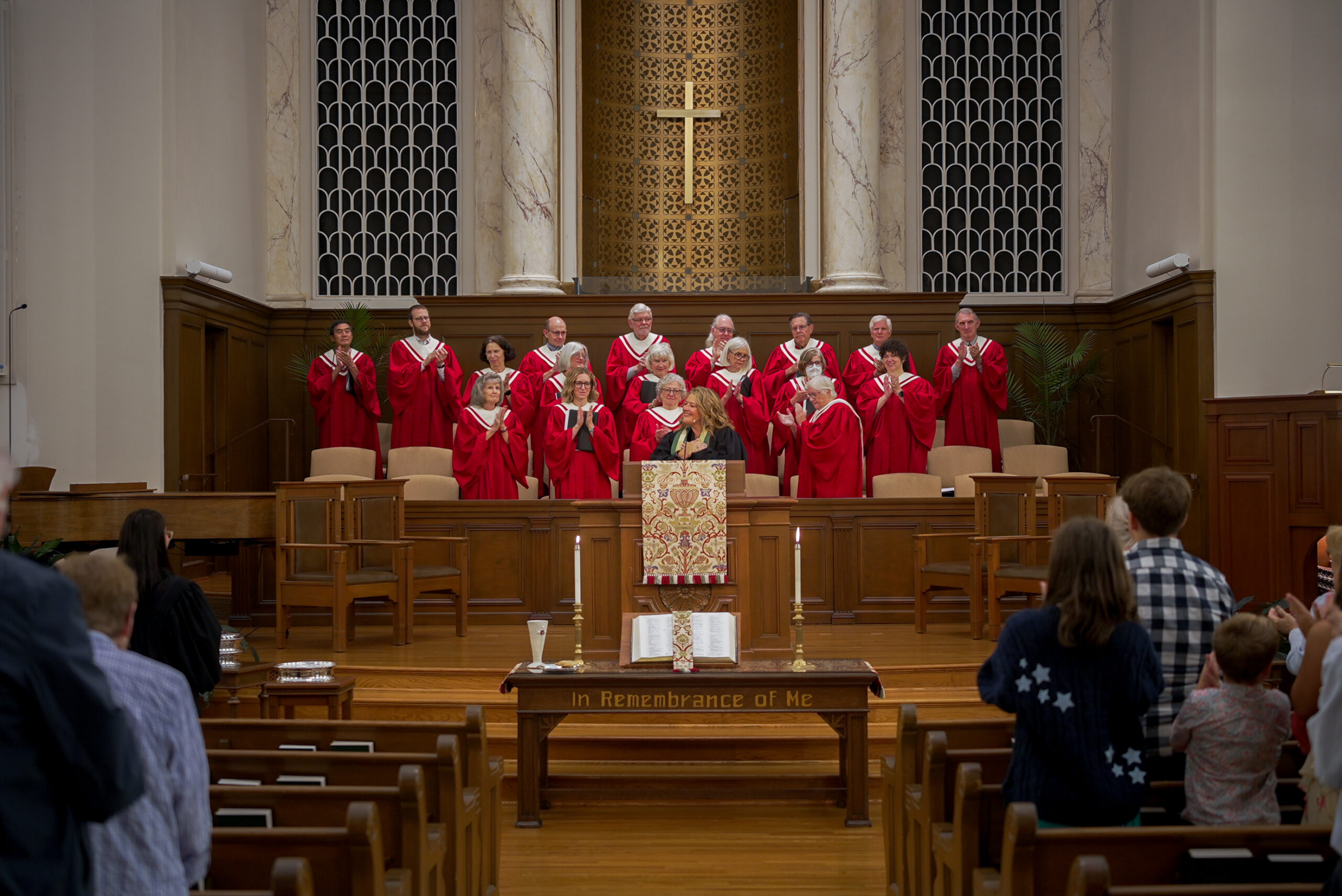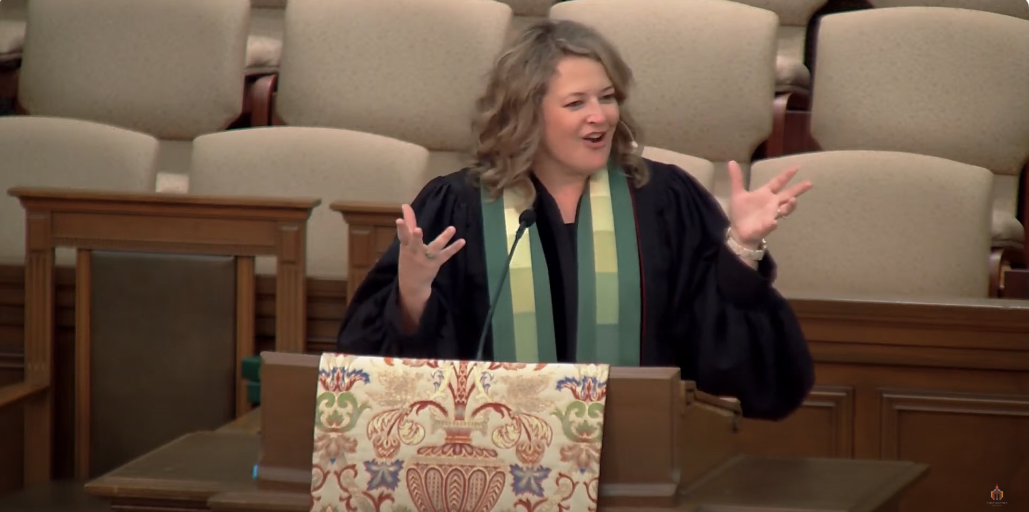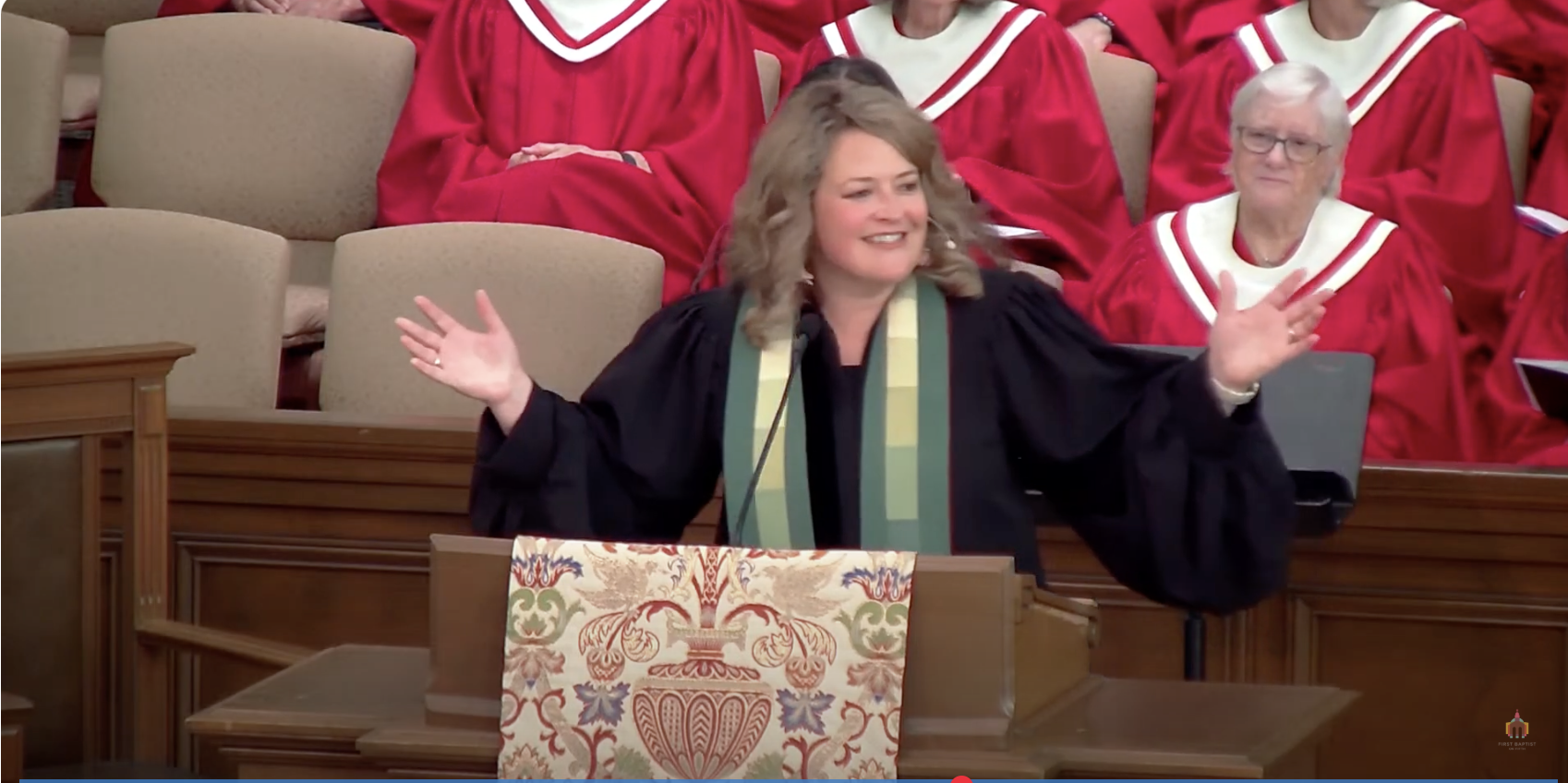I“I love you, now leave me alone.” That’s the title of an article you can
find from this week’s New York Times, subtitled: “What Friendship Means to
an Introvert.”1 (I suspect some of you can relate!) And another – while
listening to a podcast this week, I learned of a book released earlier this year
called Hanging Out: The Radical Power of Killing Time, helping disconnected yet
plugged in, polarized, and work-driven adults relearn the essential benefits of
unstructured time together.2
These two references – two of countless, I bet – speak to our culture’s
pronounced and prescient learnings about how we exist together and belong
to each other, sharing space in this earth we call home. If you worshiped with
us last week, perhaps you remember my reference to the research of our
Surgeon General, Vivek Murthy, on loneliness and belonging. In his
estimation, loneliness and isolation among Americans wrought by these
years of increased polarization, devotion to technology, a global pandemic
and widespread fear, has now reached the point of a public health crisis. We
talked together about what role the church has to play in addressing such a
substantial need all around us, and what each of us might do in our own ways
to attend it.
My grandmother Mary used to talk about things getting ‘stuck in your
craw,’ and let me just tell you – this epidemic of loneliness and how we the
church cultivate spaces of belonging is stuck in my craw. So we’re going to stay with this theme again this week as we turn again to the Gospel of John to
hear the good news.
IIAgain we’re with the disciples and Jesus in that upper room on the
night he was betrayed. To a frightened and disoriented group of his friends
who worried what life would be like without him, in last week’s text, we heard
Jesus promise to be Way, the path, the road upon which we journey through
life. Today we continue in what scholars call Jesus’s Farewell Discourse,
listening in while Jesus prepares his disciples for his impending departure.
“If you love me,” Jesus says, “then keep my commandments.” What
commandments?“Love one another. Just as I have loved you, you also should
love one another. No one has greater love than this, to lay down one’s life for
one’s friends.” That love that we’re to share with God and neighbor is
muscular and full, resilient and persistent, unconditional and complete. It’s
the love that Paul calls “patient and kind, not envious or boastful or arrogant
or rude; love that bears all things, believes all things, hopes all things, endures
all things. Love that never ends.” It’s the love we experience through God in
Christ — love that lifts us when we are low, love that serves all, especially
those that are too often overlooked or forgotten, love that shows up. The late
preacher William Sloane Coffin once said, “if we fail in love, we fail in all
things else.”3
After he calls the disciples towards the commandment to love, Jesus
say that even as he will soon go where they cannot, he won’t leave them alone
and abandoned. The disciples will not be orphaned. No, God will give another
presence — this one, the Spirit, the Advocate who will be with them forever. In the original Greek of the Gospel of John, the word for Spirit is “parakletos”
— the Paraclete, literally translated “the one who comes alongside you,” or
“the one who answers a cry.”4 So even as Jesus prepares his disciples for his
leaving, for a time soon when they cannot look directly at him to see and hear
and smell and touch and taste what that commandment of Love should entail,
Jesus promises another Advocate, another comforter and counselor and
helper and champion and defender and presence and guide. The Spirit will
abide, will “stay put” (as Barbara Brown Taylor says) right here with you.5
The lovely Irish poet, Padraig O’Tuama, reminds us that “if the
incarnation is to mean anything, it has to mean something on our own turf. It
has to enter into the clay of our landscape, the texture of our languages, and
the tensions of our cultures.”6 That’s what Jesus did in his life on earth, and
that’s what Jesus promises as his time draws to a close. Jesus promises that
God means something on our own turf. And what is it? Love never fails. God
comes close. The Spirit abides. The divine home is right here, in all things, at
all times, in all ways – within us, among us, and through us.
IIII had a conversation with one of our members this week who is
newly-facing the end of life. Among all that is unknown in the path ahead, the
one thing that is known and tried and true, she said, is that God will never
leave her. She’d seen it over the many years of living. “No matter what comes
between now and then,” she said, “I know the promises of Isaiah 43 are true:
that when I pass through the waters, God will be with me.” How did she say
she knew this? Because of you, because of her family, because of friends and neighbors and loved ones who have loved and abided with her. Until she fell
ill, this friend made a regular practice of engaging with her church. Her pew
was warmed by her presence, and her Christian life grew more thoughtful,
more generous, more faithful, more brave because of the Spirit’s work in and
through her, in and through this congregation.
Her story is particular, but not unusual, especially not here in church.
Because how do we know this? We know it because we’ve experienced it
from God and then practice it with each other: loving one another, belonging
to each other, coming close, practicing presence, abiding with. This is the
church’s work to do!
Now I understand that I’m completely biased as a minister of the gospel
serving here in our local congregation. And I recognize that you probably
expect the preacher to tell you why church matters! But as we think together
about the resurrection way of abiding, I would be remiss if I didn’t make plain
what perhaps is assumed. Among all the things we do together as a church,
among all the ways the rhythms of our gathering give shape to our life, among
all we bring and all we offer and all we imagine and all we learn, I doubt
there’s anything more important to being a church than practicing the
presence ofthe Spiritthrough loving all and abiding with.
That’s what we do here, friends! Loving all and abiding with. Not just
because Jesus tells us to, but because the Spirit moves and we cannot help
but to follow. We’re abiding – or practicing presence, as we said in our
Confession of Identity, not perfecting it. We practice using the rhythms of the
faith that go all the way back to Jesus: gathering for worship, serving God
together and apart, giving generously of ourselves and our resources, caring
for one another, breaking bread together, opening the scriptures together, sharing stories of how the Spirit of God is at work in our lives, and then
sharing that good news with those around us. These practices teach us how
to abide, they surround us with fellow travelers on the way, they sustain us
through all the changing seasons of our lives, they cultivate within us the
fruits of the Spirit.7
Sounds lovely, but let’s be real – it’s not always easy, right?In our lives,
of course, but even in our church! Because who among us hasn’t felt the pull
of the snooze button on Sunday morning? Who among us hasn’t been
beckoned to brunch or to the slow, breezy porch, a hot mug of coffee, and a
good book? Who among us hasn’t thought, “I don’t really want to get out of
my comfy sweatpants,” or “I’ll catch them next time,” or “someone else will say
yes to that need?” (No shaming here! I’d be lying if I said I’d never thought
these thoughts!)
Sometimes we might even treat going to church like going to the gym.
We might grumble a little about needing to go. Only the most avid among us
get really excited about it. (Crossfit for Christ, maybe?) It asks us to put on
different clothes or listen to different music or be around different people
than who and what fills every other day of our week. Yet after we’re done, it’s
rare that we’re not totally glad we were there.
To extend my fitness metaphor a bit, my former pastor often talked
about worship like the huddle on the football field. This is when we come
together, we make our plans, we get on the same page, we learn who’s doing
what and how we all need to show up. Then we go out into the worship that is
our very lives and play!
For those of you who worship with us online, this call to practice
presence – to love all and abide with – this isn’t just a word for the people in
the room! You’re not off the hook! If you’re not able or your life isn’t such that
you can be physically present with this beloved community, I encourage you
to find a way to practice presence too. Maybe it looks like offering comments
on Facebook or YouTube as a means of connection, sharing a prayer request
you have or encouraging another. Maybe it sounds like singing hymns with
abandon, or praying prayers aloud, or clicking to the church’s website to make
a financial gift. Maybe it feels like finding someone in our fellowship to reach
out to after worship, to knit your life and your presence to another.
This is what it means to abide. It’s showing up and making it a habit. It’s
coming close, even when it’s hard or we’d rather not. It’s refusing to leave
each other orphaned, because God in Christ through the power of the Holy
Spirit refused to leave us orphaned too. It’s practicing presence in here so we
can go and live it out there.
IVIn my first week as Minister to Young Adults at Highland Baptist in
Louisville, Kentucky, I learned quickly about the landscape of those now in my
care. The 18-35ish year-olds of Highland trisected in clear ways – there were
the YAWKs (young adults with kids), a crop of new parents who largely
returned to church life once they had children to plant and root; the YANKS
(young adults, no kids), an assortment of individuals and couples, gay and
straight, grad students and folks in their first job, all with a curiosity that drew
them to this church we loved; and finally the “former youth” as we called
them, the college students and recent grads who had grown up the church,
where some had stayed home for college and others had gone away.
Yet my job (after immediately changing the universally-despised names
of the YANKs and YAWKs Sunday School classes) was to create and nurture
community among these disparate groups, to take their shared yet
unidirectional love for God and love of Highland and turn it sideways, toward
each other, in spaces that knit them to one another, not just to me or our
pastor or the church. That proved to be a harder task than you might imagine,
for each group had particular needs, and at least at first, they didn’t always
overlap or intersect. One truth was constant: with the tiniest handful of
exceptions, not a one of my young adults felt like they fully and truly
belonged in the heart of our young adult ministry. It wasn’t always explicit or
even conscious, but many assigned the fullness of belonging to one of the
other groups.
Never was that clearer to me than when I shared a meal with one in my
group who we’ll call Stella. Stella’s 22 years of life were spent at the heart of
Highland, from birth to the present. Three generations of her family filled our
pews, along with aunts and uncles and cousins, all contributing in significant,
transformative ways to the leadership of the church. As I got to know the
church, my pastor was clear with me: you gotta know the Smith family; start
there. As a child, Stella sang solos in the children’s Christmas musical and was
a regular acolyte in worship. In her teenage years, she was president of the
youth group, a fixture on every mission trip, a leader among her peers.
Stella had gone off to college, and as she returned home to Louisville
for grad school, she found that there were now all these people her age who
were in her church! And she didn’t know them, and they, her. Over our
sandwiches and chips that day, Stella tearfully told me that all she’d ever felt
at Highland was belonging, and now, the other young adults – YANKs and YAWKs alike – didn’t know her, didn’t know her family, didn’t understand her
long history here, didn’t welcome her in the ways she needed.
I was stunned. If ever there was someone at the heart of the church, it
was her! If ever there was anyone who should do the welcoming, it was her! If
ever there was anyone who was at the center of belonging, it was her! If ever
there was anyone to whom their church gave space to practice presence,
week after week, year after year, it was her! It seemed plain as day to me, yet
not even Stella Smith could see it.
VFriends, if we who claim to follow Jesus have received the gift of the
Spirit’s presence, if we have felt her advocacy and comfort, if we accept the
call for the Spirit to reside with us and in us, if, because of that, we have
experienced the belonging with other Christians and thus belonging with
God, then to a world aching with isolation, we must become the welcomers!
We must become the abiders! We must become the practicers of belonging!
We must become the lovers of one another! We must practice what the Spirit
does with and in us – we’re to come alongside, to answer the cry, to advocate
and comfort, counsel and help, champion and defend, guide and abide.
Siblings in Christ, we must become the first responders to loneliness, the
medics of isolation, the triage team of alienation. This is our work to do! This
is our lead to take! Not our government’s, not our schools’, not our sports
teams’, not Starbucks or Apple or Facebook or Google. Practicing presence
by loving all and abiding with – this is ours, not to have and hold and hoard
and keep, but to have received and thus extend! Grace upon grace, gift upon
gift!
VIAgain from Padraig O’Tuama comes the reminder that the Irish word
for loneliness shares a root with the word for ‘grave.’8 I can’t help but wonder
if the opposite – belonging, abiding, practicing presence – might share the
very meaning of resurrection. Amen!





